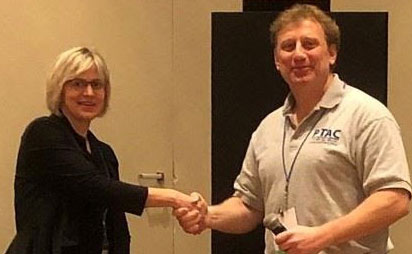
Dr. Amy Watson, CIT International board member (left) and TASC's Jac Charlier, co-founder of PTACC
(Ponte Vedra, FL) – In a new, national initiative designed to speed up entry and widen access to community-based services for people living with mental health and substance use disorders who come into contact with law enforcement, Crisis Intervention Team (CIT) International and the Police, Treatment, and Community Collaborative (PTACC)—of which TASC is a founding partner—have announced their partnership to provide an innovative approach capable of responding simultaneously to both of these health conditions.
Named the Community Intervention Deflection and Treatment Strategy (CIDaTS), this partnership addresses the frequent bifurcation between mental health and substance use treatment systems, and offers a “best path” connection-to-care strategy that streamlines service linkage when law enforcement comes into contact with individuals who need help.
CIDaTS was announced November 12 at PTACC’s 2nd Annual Deflection and
Pre-Arrest Diversion Conference in Ponte Vedra, Florida.
“Communities across the nation are simultaneously grappling with how to adequately respond to three deeply profound challenges: the opioid epidemic, the rapid reemergence of methamphetamines and cocaine, and people with mental illness, all of which can create high rates of contact with first responders, and in the case of illicit drugs, with law enforcement in particular,” said Jac Charlier, PTACC co-founder and executive director of TASC’s Center for Health and Justice. “Responding to these complex issues, law enforcement has been repeatedly called upon to be part of the response to behavioral health issues, an area outside of their primary mission and training. With CIDaTS, however, first responders will now have a best path approach that allows them to get the person quickly handed off to treatment and then move on to their next call.”
“Every person deserves to have access to behavioral health care without contact with the criminal justice system, which includes law enforcement,” said Dr. Amy Watson, CIT International board member. “Community-based services need to be available so that community members can turn to those services that are independent of law enforcement first and only turn to law enforcement when warranted.”
Starting
in January 2020, CIT International and PTACC will take CIDaTS from concept to
practice through the development of a series of CIDaTS Implementation Briefs to
support communities wanting to develop CIT programs and substance use disorder
deflection strategies simultaneously. By fall 2021, the first CIDaTS
communities will be identified.
“Unlike existing approaches that falsely separate mental health and drug treatment responses, as well as crisis and non-crisis responses, CIDaTS will provide the best path response to these challenges that will lean heavily on early, pre-crisis, preventive approaches,” added PTACC Founding Member Leslie Balonick.
“Substance use and mental health conditions are two main drivers of justice system involvement. So many police encounters involve people who have co-occurring disorders,” said TASC President Pam Rodriguez. “We applaud this partnership to address these two conditions before people enter the legal system. This is a vital and necessary national initiative.”
Said CIT International Board Member Ron Bruno, “The purpose of this approach is to lower the barriers that stop people from being able to rapidly access much-needed treatment for these two common behavioral health challenges, especially for those who also have frequent contact with the justice system. When the person is ready, the treatment needs to be ready too.”
CIT
International, Inc. is a nonprofit membership organization whose primary purpose is to facilitate understanding, development, and implementation of Crisis Intervention Team (CIT) programs. CIT programs are collaborative efforts to create and sustain more effective interactions among law enforcement, mental health care providers, individuals with mental illnesses, their families, and communities; to build comprehensive mental health crisis response systems that reduce the role of law enforcement; and to reduce the stigma of mental illness.
The
Police, Treatment, and Community Collaborative (PTACC) is an alliance of practitioners in
law enforcement, behavioral health, community, advocacy, research, and public
policy, whose mission is to strategically widen community behavioral health and
social service options available through law enforcement diversion. The purpose
of the Collaborative is to provide vision, leadership, advocacy, and education
to facilitate the practice of pre-arrest diversion across the United
States. PTACC is the national
voice of the pre-arrest diversion and deflection field.